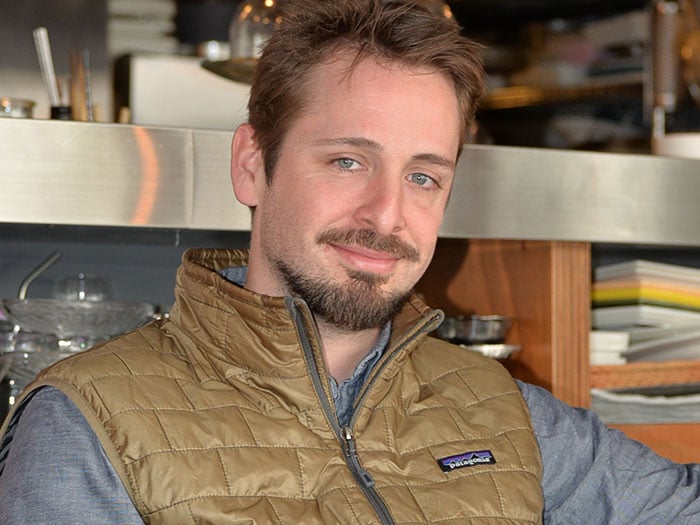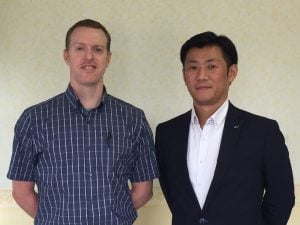
Working in a cafe or restaurant in Japan takes a special kind of person, especially if you are a foreigner. JobsinJapan.com sits down with Mr. Nicolas Koreni, General Manager, of Cafe Company Inc., which owns and operates over 60 different brands of cafes and restaurants in Japan.
Nicolas Koreni, Global Manager, Cafe Company Inc.
Q: First off, how about some background about the company.
A: Café Company started in 2001 in Shibuya, as a Japanese company that started with one café. The owner was interested in urban planning, and began to expand after the success of the first shop. Sixteen years later, we have 100 cafes, with four in Hong Kong. We are beginning to expand internationally.
Q: Can you briefly outline the expansion strategy?
A: The idea isn’t to expand rapidly the way, for example, McDonald’s or Starbucks has done, franchising, etc. We grow by one location at a time, focusing on each store, each menu individually, and ‘localizing’ the food and atmosphere. Each location is unique. The idea is that we’re not just making a restaurant, but helping to build a community. We think of ourselves as a community building company focused on restaurants.
Q: And this is also affected by the type of customers you serve, yes?
A: Of course. In some locations are built around the client base of mothers with children, and others around single young people, etc. It all depends on the neighborhood. It isn’t the most efficient way to build out, but it is more fun.
Q: How do menus differ?
A: Places in Roppongi, for example, where employees go out for a drink after work, might have a large selection of alcohol, whereas a family-oriented place in Kawasaki might have more food items and just a few kinds of beer and maybe a single red or white house wine.
Q: The Café Company actually makes cafes then?
A: Yes. We have 60 different brands, including Wired Café, which was one of the very first ‘oshare’ cafes, which was cool and laid back, and had young people wearing T-shirts and hoodies serving simple rice and pasta plates, and crepes, etc. Wired Café is like a fashion brand; we try to locate them in shopping malls.
Q: How many Wired Cafes do you operate?
A: There are 30 Wired Cafes, and they are the most numerous brand. The other brands number just a few of each. The Spanish Tapas have become a popular concept in Japan; it fits well with the small-order style prevalent in Japanese izakaya and sushi shops and features rice and fish items.
Q: Where are your shops located?
A: About 85%-90% of the shops are located in the Tokyo/Kanto area. In addition, there are four in Kyoto, three in Osaka, one in Nagoya, and a couple in Sendai.
Q: What’s the growth projection going forward?
A: In addition to the four locations in Hong Kong, we will open a few new cafes in Taiwan this year, and have a few projects in the U.S. and Europe that have yet to be finalized. We don’t have a fixed idea or quota about how many stores to build; if we have a good location, and a good partner, we will do it. If we were searching for pure growth, we would just hit the Chinese market hard, but that’s not what we want to do. There are a lot of hurdles in finding a good partner. It’s the same store as far as the domestic rollout is concerned. We’ve be opening about five to 10 new cafes per year.
Q: Are all of the locations directly operated then?
A: Yes. We haven’t franchised anything yet.
Q: That sounds like a sprawling operation. So your role is to essentially set up each store?
A: Yes. I am a licensed real estate agent in Japan, so I talk to the location owners and discuss a plan and a menu. It can be challenging to come up with a menu that works. Pancakes, waffles, and crepes might work in one location, but not in others, etc.
Q: How many people does the company employ?
A: There are about 250 full-time employees, and about 2,000 part-timers in all. The part-time employees include customer service and kitchen staff.
Q: So what kinds of people are you interested in hiring?
A: As part of our plan to become more global, we are looking for people to help with the buildout, including local store managers, etc. We would like to hire them here, and then get them accustomed to our system, before sending them abroad. I have hired about 200 people, mostly part-time workers, over the last two years – many of them university students or exchange students. Of these, about five have become full-time workers.
Q: What kinds of qualifications should they have?
A: We are looking for people who like customer service, like the restaurant/food business, have been in Japan for a while, and are not so keen on teaching English. The part-time jobs include waiters and waitresses, cooks, and kitchen staff. Full-time workers need to work at a café to get field experience before moving on to a strategic/planning type of job. Of course, it would be great if they had plans to stay in Japan longer term.
Q: What kinds of new projects are in the pipeline?
A: We will open up a hotel in Asakusa in March. It will be our first hotel, but we’d like to do more. It’s a ‘boutique hotel’ type of design that will allow foreign visitors to get more of an integrated feel for the Asakusa neighborhood that a large hotel affords.
Q: How many rooms in all?
A: Two floors will be devoted to hostel-type beds, and the top floors will have larger rooms. The price range will be from Y5,000 to Y50,000 per night. It’s a wide range. The idea is that we want to get a diversity of people in there. The cheapest rooms will still be more expensive than the average hostel.
Q: The appeal to backpacker may be limited then, yes?
A: The majority of visitors to Japan are actually repeat visitors, which means they have the budget for going out and doing things, all of which require money. But most people don’t want to spend a lot on hotel rooms, because they don’t plan on being there a lot of the time. They do want to experience Japan in a more direct way.
Q: The majority of tourists to Japan come from elsewhere in Asia, such as China. Are you ready for that?
A: Actually, we only expect 10-20% of our hotel quests to come from China. Chinese like to come to Japan in large groups and book adjoining hotel rooms. We won’t have that kind of capacity anyway with only 30 rooms. Most will be from people who want to come back to Japan to experience something in which they are already keenly interested.
Q: So you need international hotel staff as well?
A: The hotel staff has already been hired. As we open more hotels we will need reception staff, etc. but the main need right now is to staff the cafes.
Q: How good does their Japanese need to be?
A: Conversational level Japanese skill is important. It doesn’t have to be perfect, but the ability to interact with the native staff is important. Reading skill is not that important, aside from being able to understand the menu. A hospitality mindset is also good to have.
Q: Any preferences for age or gender?
A: No, but for many cafes the average client is in their 20s, so our hiring tends to gravitate toward that age level. So we’re talking about university students, etc. Most people who come to us are here from abroad, either to study or for shorter-term work. No experience is required for the part-time jobs, especially.
Q: How about visa sponsorship?
A: For the longer-term and full-time positions, yes.
Q: For people involved in the overseas expansion plan, what do you want to see on the applicant’s resume?
A: Actually, while many foreign companies focus on skillsets and degrees like MBAs, etc., we looking for people who can communicate well, get along with others, and have a passion or sincere interest in the restaurant/food business.
Q: Many larger chains such as McDonald’s will open many new stores per year, but also shutter others. Does Café Company do the same?
A: We normally sign leases for periods of seven to 10 years, so we tend to stay until the lease expires. If things don’t go well in the interim, we will change the menu or design midstream, for example from a café to an izakaya, etc.
Q: What is the proportion of Japanese to foreign workers?
A: It’s about 95% Japanese. Most of the foreigners end up going back to their home countries. There is a severe labor shortage in Japan. Some companies will hire troves of, say, Chinese young people in number to staff their restaurants. We take a slower, more careful approach.
Q: Are employment contracts the same of Japanese and non-Japanese employees?
A: Yes, once they are hired, the terms are the same.
Q: What does the average working day look like for a full-time worker?
A: Five to six day week about 10 hours per day. Full-time workers do a lot the same jobs as the part-timers, in addition to the managerial/operational tasks. They don’t wear neckties to work.
Q: Are there locations that are more difficult to run than others?
A: The busier it gets, the easier the cafes are to run. There are two types of shops: those located in shopping centers or train stations, and those that are so-called ‘stand-a-lone’ locations. The shops that are located in naturally more high-traffic areas are easier to manage because flows of people are easier to predict.
Q: Identifying trendy food preferences seems to be an important job, yes? Is the Japanese appetite becoming more Westernized?
A: In many ways the Japanese diet is already very Westernized. The task now is not just identifying a trendy idea to put on the menu, but how to get long lines of people who will wait for your food.
Q: What are the hottest or most popular food ideas in the market now?
A: Cheese tarts have been popular for the last few years. More recently, hamburgers and pancakes have been making a run. A good gourmet hamburger or pancake can be found almost anywhere now.
Q:Sounds like cuisine is like fashion for you.
A: Brand identity is important in Japan. Many people, for example, are ok with being seen with a Starbucks cup in their hands, but not so with competitor brands. We spend a good deal of time and energy researching and trying new ideas and images to go with a brand and food items, including scanning the popular media. One overseas research trip compelled us to create a café that features fried chicken atop a waffle, covered in syrup as a featured menu item. We serve this in a diner type of café. On the floor below, the shop offers a burlesque show.
Q: Are you interested in doing theme restaurants, like Alice and Wonderland, cat and bird cafes, etc.?
A: Not really. We do look at trends like that, but we prefer to focus on the food and drink as the staple.

















